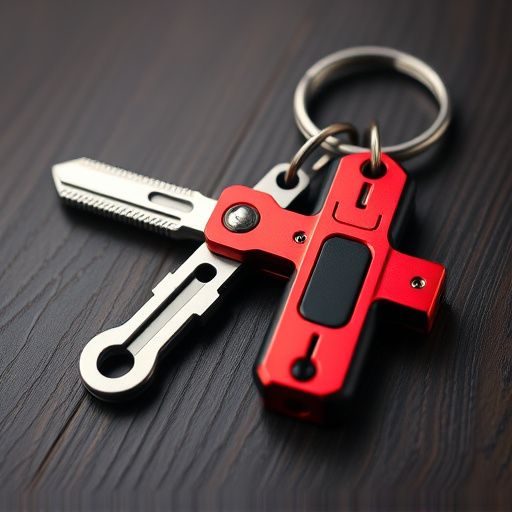Legal recognition of Heart Attack Self Defense Keychains has increased globally, with governing bodies setting standards for functionality and safety to empower individuals during emergencies. These keychains are mandated to include alarms, GPS trackers, and clear labeling in jurisdictions with strict personal safety regulations, enhancing bystander alertness and emergency response. Manufacturers and users must comply with local laws, ensuring the keychain's legality and effectiveness while promoting public safety through consumer protection laws that regulate design, materials, and instructions.
In today’s world, personal safety is paramount. One innovative solution gaining traction is the heart attack self-defense keychain—a compact device designed to provide critical assistance during medical emergencies. This article delves into the legal framework surrounding these personal safety devices, focusing on key aspects such as heart attack response requirements, self-defense tool regulations, and consumer protection laws. Understanding these guidelines ensures that innovations like heart attack self-defense keychains operate within legal parameters while enhancing user safety.
- Legal Framework for Personal Safety Devices
- Heart Attack Response Requirements on Keychains
- Self-Defense Tool Regulations and Compliance
- Consumer Protection Laws: Keychain Innovations
Legal Framework for Personal Safety Devices
In many regions, personal safety devices like the heart attack self-defense keychain have gained legal recognition as valuable tools for individual protection. The legal framework surrounding these devices varies across jurisdictions but generally emphasizes their role in enhancing public safety and empowering individuals to defend themselves in emergencies. This recognition is crucial, as it ensures that manufacturers and distributors operate within ethical and legal boundaries, providing quality products that meet specific standards.
Governing bodies often mandate certain features and guidelines for personal safety devices to ensure their effectiveness and reliability. For instance, the presence of emergency contact numbers, alarm systems, or even basic self-defense mechanisms in keychains can be legally required. These regulations promote consumer confidence, guaranteeing that such devices serve their intended purpose without causing harm.
Heart Attack Response Requirements on Keychains
In many jurisdictions, especially those with stringent personal safety regulations, a Heart Attack Self Defense Keychain can be a game-changer in emergency situations. These devices are designed to provide quick response tools for individuals suffering from cardiac events. The legal requirements vary across regions, but commonly include features like an integrated alarm system that alerts nearby bystanders or emergency services when activated. Additionally, these keychains often have a built-in GPS tracker, enabling first responders to pinpoint the user’s location accurately.
To ensure their legality and effectiveness, it’s crucial for manufacturers and users to stay updated on local laws and guidelines. Requirements may encompass specific performance standards, such as alarm decibel levels and GPS accuracy, as well as labeling and packaging specifications. Compliance with these Heart Attack Response Requirements is not only a legal necessity but also ensures that the keychain functions optimally during critical moments, potentially saving lives.
Self-Defense Tool Regulations and Compliance
In many jurisdictions, self-defense tools like the heart attack keychain are subject to specific regulations and legal requirements. These devices, designed to assist individuals in emergency situations, must adhere to safety standards and compliance measures to ensure their effectiveness and legality. Regulations often cover aspects such as functionality, construction materials, labeling, and user instructions.
Compliance with these rules is crucial for manufacturers and distributors to ensure their products can be legally sold and carried. It’s important for users to understand these regulations, as possessing or carrying a self-defense keychain without meeting the necessary legal standards could result in legal consequences. Staying informed about local laws and keeping up with industry updates ensures that individuals wielding such tools are both protected and in compliance.
Consumer Protection Laws: Keychain Innovations
Consumer Protection Laws play a pivotal role in ensuring that innovative products on the market, like the Heart Attack Self Defense Keychain, meet certain safety standards. These laws are designed to safeguard consumers from potentially harmful or ineffective devices. In the case of self-defense keychains, regulations focus on their reliability and functionality, ensuring they can perform as advertised without causing additional harm.
The legal framework for such products involves rigorous testing and certification processes to guarantee their safety and effectiveness. Manufacturers must adhere to these standards to ensure that their keychains are not only functional as a self-defense mechanism but also do not pose any risks to users’ well-being, especially in critical situations like heart attacks. This includes considerations of materials used, design integrity, and user instructions to prevent any adverse outcomes.
When it comes to keychain safety devices, understanding the legal requirements is vital for ensuring their effectiveness and consumer protection. From heart attack response features to self-defense tool regulations, each component plays a crucial role in making these compact tools safe and reliable. As the market for innovative solutions like heart attack self-defense keychains continues to grow, adhering to relevant laws and standards is essential to protect users and maintain public trust. With proper compliance, these devices can make a significant impact, offering peace of mind and potentially saving lives.
